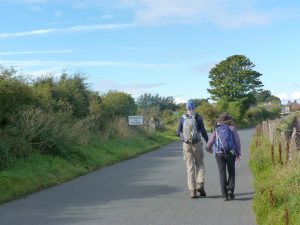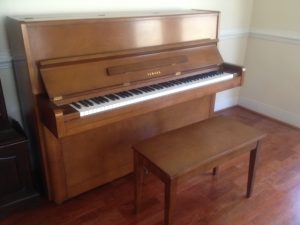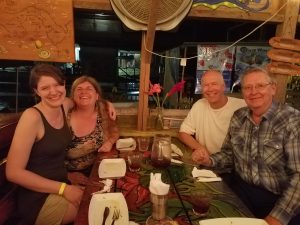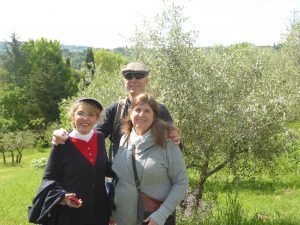
So you’re considering taking the plunge! There’s a lot to do before you pack your bags. The very first step in moving into this new lifestyle is to really, carefully examine your current lifestyle. What is absolutely necessary for you to be happy? What can you jettison in order to make nesting work for you? And what do you spend money on that you really don’t need? This is a major lifestyle change, so it’s important to put a lot of thought into it up front.
Just because we do three months abroad, three months home doesn’t mean you have to do it that way. Maybe you only want to nest once a year. Maybe you want to nest for shorter times. A lot depends on your finances, your family situation and your work situation. Hopefully after asking yourself if nesting abroad is right for you, you’ve come up with a plan that will work best for you. The adjustments you have to make to make it work will be different for each situation.
Probably the biggest areas of adjustment are your home, your work arrangements and your family and social life. All of them will be significantly impacted, and it’s important that you think through and are comfortable with the changes.
In our case, our house was very large for just the two of us. It was beautiful, and I loved living there. But it was a real drain on our finances and we worked hard to pay for it and maintain it. It really made a lot of sense to downsize.

We also were living in a very expensive area. A smaller house in the same town wouldn’t save us nearly as much as moving a few hours drive away. Although we have lots of friends in the area, we realized that because of busy schedules, we only got together on weekends anyway, so we could continue to meet for weekend trips or halfway in-between. We spent about eight months researching areas to move to that were near us with a lower cost of living that would afford us a similar quality of life. We now love Charlottesville and all our new friends who are there.
I cried when we decided to sell the house. I cried when the sign went up in front of the house. I cried when we packed to leave. But now that we’re settled in our new house, I just shake my head thinking of all the energy and cost that went into maintaining that big place. It’s so freeing to know that we don’t have to worry about the cost and upkeep anymore.

The more you can simplify your life, the easier it will be for you. The thing is, the process can be hard. Really hard. You’ve got a lot of memories tucked away in a lot of things, and it’s difficult sometimes to let go. One of the hardest things for me to sell was my grandfather’s piano. I hadn’t played in years, and it took up a lot of room. But my grandfather had been a musician, and I had lots of fond memories of him playing that piano. I finally took a bunch of photos of it so I’d have the memory. Then I found a very talented music student who needed a piano. I know it’s being played again like it was when it belonged to my grandfather and that helped a lot when I watched it go out the door.
I had books. Wow, did I have books. But Kindles store up to a thousand books, and so I downloaded my favorites and donated the physical books. An added bonus is that I can now take my library with me when we travel.
Posting things on Craigslist to sell or donate was a really good way to clear out the house. Not only was it relatively easy to find new owners, in many instances, I was gratified by who got the items I sold and donated. My dining room chairs went to a wonderful family who had six foster children and up to then couldn’t afford to get chairs for everyone. The cross stitch supplies I culled were given to a lovely young woman who was terminally ill and was trying to embroider gifts for all her family members in the time she had left. In so many cases, the items I had stored in closets are now being used and being appreciated. Knowing that made it so much easier to let all those things go.

If anything, our new house is still bigger than we need. After living six months out of the year in apartments in other countries, we’ve learned that we really don’t need much space to get by. Our house near Charlottesville, which once felt like a radical downsize, now seems large when we come back from abroad. Even though we sold a lot of furniture and stuff when we downsized, it still feels like we’ve got way more than we need each time we return. Our lesson learned here is that if you’re only living in a house six months of the year, it doesn’t need to be big. If you can get by for six months of the year with what you can fit into one suitcase, you’ve learned that you really don’t need much when you come home. Our suggestion is to set your goal to downsize as much as you think you can stand, and then downsize a little bit more.
We purposefully bought a house with a landscaped front yard so there was no yard to mow. A townhouse or condo might have even been a better choice. If you can escape having to worry about yardwork, you’ve helped yourself out tremendously. If you can escape having to worry about maintenance at all, you’re way ahead in the game.
While we were researching where to move, packing up the house and selling lots of furniture, we were also looking for ways to shift from physical to digital work. Sue already did much of her work digitally as a writer. Al had taught at American University previously, and found that they were interested in expanding their on-line class offerings.
Possibly the best way to shift into digital work is to talk to your current clients or employer. Is there a way that your work can be done remotely – especially if you promise to show up physically occasionally while you are back in town? Can you video conference or Skype? Maybe, like Al, you can shift to a consulting role. (Lee, please write more here.)
If you need more help in finding digital work, a great place to begin is to check out my friend Leslie’s site Work at Home Success. Leslie vets and researches legitimate opportunities for home careers, and lists new employment possibilities every week. There really are genuine jobs out there for people who want to live this lifestyle.
Your relationship with family and friends will also be impacted. For starters, there’s the time you’ll be gone – in our case, six months of every year. You’ll also have new experiences and outlooks from your travels. Your world views may change, and you and your friends and family won’t be sharing all the same life events anymore.
One way to mitigate this is to invite them along! We have gotten a two bedroom flat everywhere we’ve gone so far because people want to come visit. Sue’s father has visited every place we’ve gone. Our daughter has visited half the places (she has a 100% remote job) and we’ve had friends come about half the time, too. We’ve loved how that has worked out.

We just make sure that our visitors know we are working part time, which frees them up to do some sightseeing on their own. It has really deepened and strengthened relationships because we’ve shared some amazing things with some of our favorite people.

For those who can’t travel with us, we use Skype, email and Facebook to stay in touch. It takes a little extra effort, but it’s important to keep the relationships up. It’s also very important to reach out the moment you get back to your base home. We try to bring back little gifts for our favorite people – something simple like a small local craft or edible treat and then make sure we see them soon after we arrive back to give it to them. I keep in touch with my book club by writing up my thoughts about the books they read the months I’m gone, and I try to bring back bookmarks for everyone from where ever I go. (A tradition that wasn’t started by me, but it works really well!) Al volunteers with different organizations in our area and he regularly skypes into meetings and keeps up with what they are doing on line.
Maybe the most challenging relationship for us to keep up is with our grandson. It’s hard to leave, knowing we won’t see him for three months. But we Skype, tell him about where we’re going, and bring him back things we know he is interested in. We’ve collected rocks for him, and in Bocas del Toro, I collected things to do with frogs. We can email him photos and little videos. And of course, he’s one of the very first people we visit as soon as we return. Our family and friends are why we just nest abroad, after all. Flying home again is very sweet indeed.